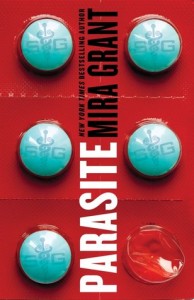Mira Grant, author of the NEWSFLESH trilogy (one of the few zombie books I’ve enjoyed) has a new book out today: PARASITE. She’s graciously agreed to answer a few questions….
ANTHONY: Let’s start with the basics: What is PARASITE about?
MIRA: Parasites. No, that isn’t fair, even if it’s accurate! It’s about genetic engineering, and the uneasy marriage of science and profitability, that place where smart people do stupid things in the name of making a buck. It’s about finding yourself. And it’s about that sharply indrawn breath before the end of the world.
ANTHONY: I had the chance to read the first chapters, which were included in the ebook edition of LIGHTSPEED magazine’s October issue. And I have to say: even in that short space, you managed to make me shiver. I anticipate a lot more seat-squirming before the book is done. Should readers expect a lot of bodily fluids to fly, since we’re dealing with intestinal parasites?
MIRA: Not as many as you might think! Parasite is an intentionally ‘dry’ book in the body fluids sense, because there’s so much horror inherent in the concept that dumping buckets of blood on top just seemed, well…silly. Like, why would you bother, when everything has already been ruined forever by the sheer existence of intestinal parasites? I brought a big box of nope to page one, and spend a lot of time unpacking it.
ANTHONY: One of the things I love about your writing is the strong, but often emotionally damaged, female protagonists. Can you tell us a bit about Sally Mitchell?
MIRA: Sally Mitchell–who prefers to be called “Sal,” thank you, Sally was another country–was in a very bad accident several years before the start of the book, and she’s still dealing with the after effects, which are mostly psychological at this point. She’s dyslexic, she has a severe fear of cars, and she has no memory of her life before the crash. She’s a very kind person. She wants to be good. She’s just not always completely certain that she understands what that means.
ANTHONY: This takes place only a decade in the future, correct? I know you love to research, so I’m curious as to what current medical breakthroughs you see leading to this potential future?
MIRA: I think that the breakthrough described in this book, harnessing controlled parasites to deal with certain allergies and auto-immune disorders, is coming. I think we’re a little bit more, well, balanced about it than the people in this book. I also think that we’re sort of holding our breath right now, because we need to get the politics out of science and really look at the human body–male and female–without ideological blinders getting in the way.
ANTHONY: If memory serves, this is the first Mira Grant book to debut in hardcover. How does that feel?
MIRA: Terrifying.
ANTHONY: PARASITE is the first of a duology called “Parasitology.” Any hints as to when we can expect the second book and what it will be called?
MIRA: Nope! I don’t mean to be stubborn, but I can’t really say much about the second book without giving spoilers for the first, and we’re still debating the title a little bit. I’m hoping it’ll be sorted soon.
ANTHONY: You know I have to ask at least one question related to your Newsflesh universe. As we discussed on #sffwrtcht on Twitter a few weeks back, Mahir Gowda has become a fan favorite. What is is about him (as opposed to, say, Georgia and Shaun Mason) that people seem to gravitate to?
MIRA: Mahir is the Horatio of the piece. He’s the guy who exists to see things unfold, and he’s not untouched by them, he’s not some omniscient narrator: he’s a part of the story he observes. He just doesn’t get to have a glorious death or an unequivocally happy ending. He’s us. He’s still searching for his answers, and he always will be. I love him so much.
ANTHONY: Okay, two questions. The novella “How Green This Land, How Blue This Sea” was released in July, featuring Mahir exploring how the Uprising affected Australia. Can we expect more world travels in novella form in the near future? Perhaps next summer?
MIRA: There are currently no further Newsflesh novellas under contract with Orbit.
ANTHONY: The internet cannot see the Sad Face I’m making, but I’ll hold out hope that there’s an unspoken “yet” at the end of that answer. Now, we’ve chatted so many times now that my usual “favorite book” closing question is probably a bit played out. So here’s a variation: What one text on virology/parasitology would you recommend to someone who becomes interested in the topic because of reading PARASITE?
MIRA: Carl Zimmer’s Parasite Rex is probably the ‘pop science’ work on parasites. It’s factual but accessible, and will provide an amazing jumping-off point if you want to learn more about the factual world of our intestinal buddies.
Want to know more about the SymboGen company and their work? Go to Symbogen’s website.
You can follow Mira Grant, aka Seanan McGuire, on Twitter @seananmcguire. You can check out both her Mira Grant and Seanan McGuire websites. And of course you can buy PARASITE on Amazon and on Barnes & Noble as well as purchasing it from all respectable (and probably some not-so-respectable) brick-and-mortar bookstores.

